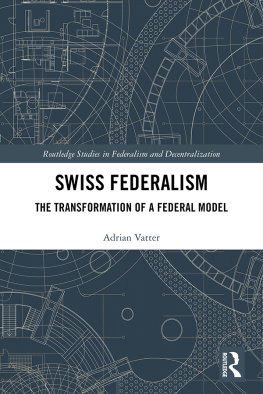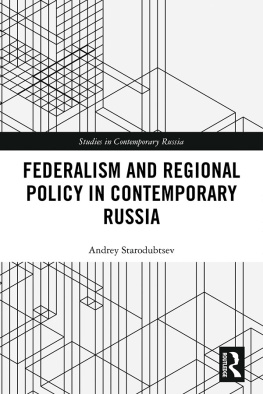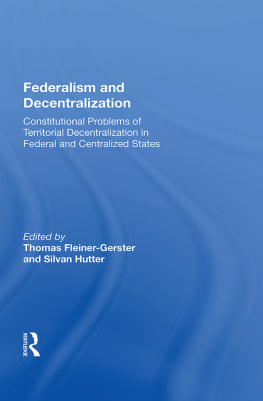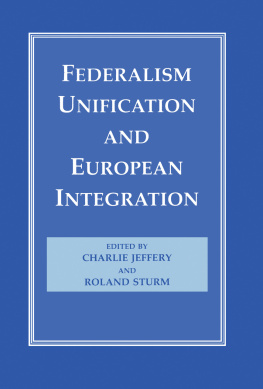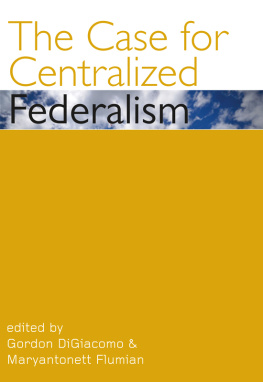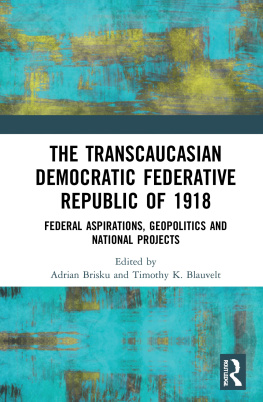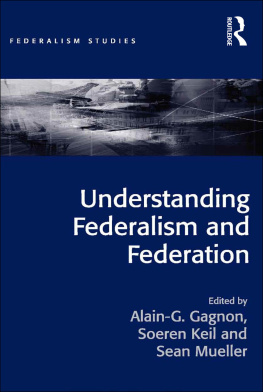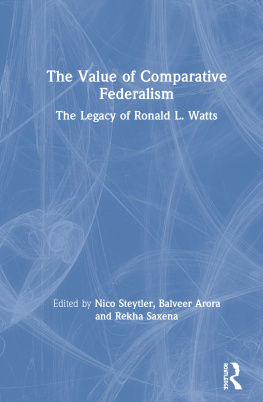Swiss Federalism
The political and economic crisis of EU integration has made it increasingly apparent how challenging it is to bring together different sovereign cultures, languages and regions into a single political system. Switzerland being one of the three classic federations in the world can provide insights, particularly in relation to the accommodation of cultural, linguistic, religious and regional diversity, which can help tackle contemporary challenges.
This book describes and analyses the characteristics, institutions, and processes of Swiss federalism, along with its combination of stability and change. It presents a comprehensive study of the federal system of Switzerland, where it comes from, how it operates, and the way it has changed of late. This will allow readers to appreciate the specific and current answers the Swiss case offers to the main questions raised by wider federal research.
This text will be of key interest to scholars and students in federalism and territorial politics, political institutions, local and regional government studies, multi-level governance and more broadly to European and comparative politics.
Adrian Vatter is Professor of Political Science (Swiss Politics) at the Institute of Political Science, University of Bern in Switzerland.
Routledge Studies in Federalism and Decentralization
The series publishes outstanding scholarship on federalism and decentralization, defined broadly, and is open to theoretical, empirical, philosophical, and historical works. The series includes two types of work: first, it features research monographs that are substantially based on primary research and make a significant original contribution to their field. Second, it contains works that address key issues of policy-relevant interest or summarise the research literature and provide a broad comparative coverage.
Series Editors: Paolo Dardanelli, Centre for Federal Studies, University of Kent, UK, and John Kincaid, Lafayette College, USA.
Formerly Routledge Series in Federal Studies, edited by Michael Burgess and Paolo Dardanelli, Centre for Federal Studies, University of Kent, UK:
The Territorial Management of Ethnic Conflict, 2nd edition
Edited by John Coakley
Protecting the Periphery
Environmental policy in peripheral regions of the European Union
Edited by Susan Baker, Kay Milton and Steven Yearly
The End of the French Unitary State?
Edited by John Loughlin and Sonia Mazey
Presidents, Governors, and the Politics of Distribution in Federal Democracies
Primus Contra Pares in Argentina and Brazil
Lucas I. Gonzlez
Consolidation Policies in Federal States
Conflicts and Solutions
Dietmar Braun, Christian Ruiz-Palmero and Johanna Schnabel
Ethnic Conflict in Asymmetric Federations
Comparative Experience of the Former Soviet and Yugoslav Regions
Gorana Grgi
Emerging Practices in Intergovernmental Functional Assignment
Gabriele Ferrazzi and Rainer Rohdewohld
Swiss Federalism
The Transformation of a Federal Model
Adrian Vatter
Swiss Federalism
The Transformation of a Federal Model
Adrian Vatter
First published 2018
by Routledge
2 Park Square, Milton Park, Abingdon, Oxon OX14 4RN
and by Routledge
711 Third Avenue, New York, NY 10017
Routledge is an imprint of the Taylor & Francis Group, an informa business
2018 Adrian Vatter
The right of Adrian Vatter to be identified as author of this work has been asserted by him in accordance with sections 77 and 78 of the Copyright, Designs and Patents Act 1988.
All rights reserved. No part of this book may be reprinted or reproduced or utilized in any form or by any electronic, mechanical, or other means, now known or hereafter invented, including photocopying and recording, or in any information storage or retrieval system, without permission in writing from the publishers.
Trademark notice: Product or corporate names may be trademarks or registered trademarks, and are used only for identification and explanation without intent to infringe.
British Library Cataloguing-in-Publication Data
A catalogue record for this book is available from the British Library
Library of Congress Cataloging-Publication Data
Names: Vatter, Adrian, author.
Title: Swiss federalism : the transformation of a federal model / Adrian Vatter.Description: Abingdon, Oxon ; New York, NY : Routledge, 2018. | Series:
Routledge studies in federalism and decentralization | Includes
bibliographical references and index.Identifiers: LCCN 2018004299| ISBN 9781138294271 (hbk) | ISBN 9781315231693 (ebk)
Subjects: LCSH: Federal governmentSwitzerland. | Central-local government relationsSwitzerland. | SwitzerlandPolitics and government.
Classification: LCC JN8788 .V38 2018 | DDC 320.4494/049dc23
LC record available at https://lccn.loc.gov/2018004299
ISBN: 978-1-138-29427-1 (hbk)
ISBN: 978-1-315-23169-3 (ebk)
Typeset in Times New Roman
by Wearset Ltd, Boldon, Tyne and Wear
Contents
Figures
Tables
Foreword
This book is most welcome and comes at the right time. It is highly welcome because it makes the features of the Swiss federalism known to English-speaking students and to a larger international public as well. Indeed, while Swiss constitutionalists and political scientist recognize Swiss institutions as an outstanding, even unique example of federalism, there has been no comprehensive English-language publication on its institutions, its political processes, and cultural embeddings so far. Vatters book, therefore, fills a considerable gap. Moreover, the publication is timely. In the last 20 years, young political scientists have contributed with a growing number of journal articles on specialized topics and aspects of federalism. Apart from his own substantial publications, Vatter thus draws from a rich literature and carefully relates it to the present analysis. The result is a book up to date with the state of art of academic research, rich in details but at the same time giving the grand picture of Swiss federalism.
What are, in Vatters view, the essentials of Swiss federalism? It was history, in the first place: 25 subnational units which in 1848 created their common nation state bottom-up. As these cantons were different in religion, language, and culture, federalism was the promise to protect minorities and to accommodate conflict in a multicultural political nation. Up to now, the cantons have successfully defended utmost autonomy vis--vis the central government. It is a three-tiers system, then, in which the subnational units of the municipalities and the cantons have important voice in federal decisions and can live up to their autonomy because of own and independent fiscal resources. Moreover, the constitutional guarantees of federalism are linked to direct democracy, which helped to maintain an equilibrium between unity and diversity. Relations between the Federation and the cantons are then characterized by a political culture of consociationalism, allowing to resolve political conflict in creative ways. And finally, Swiss federalism is rich in informal procedures, which prepare the many transitions to formal institutional change.


